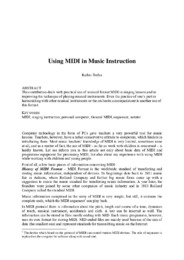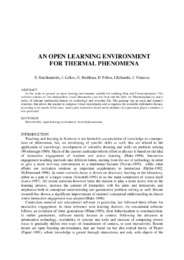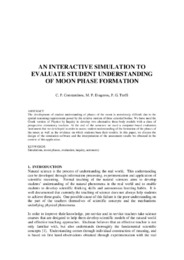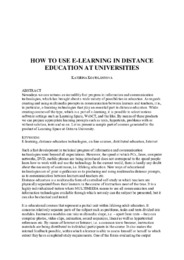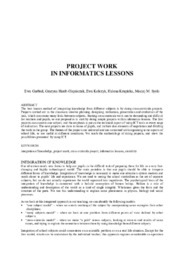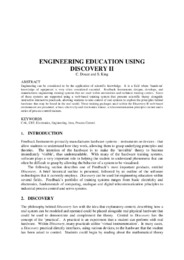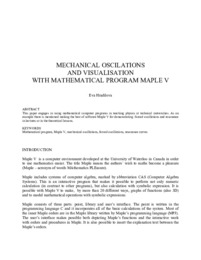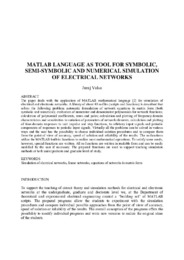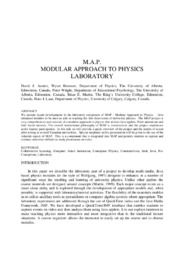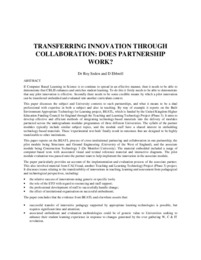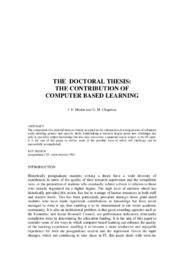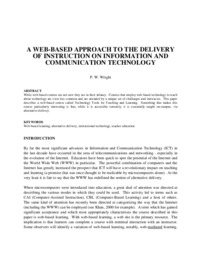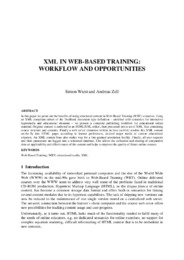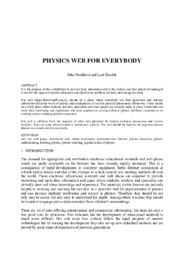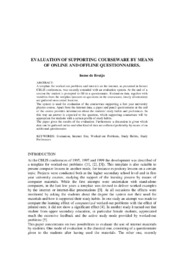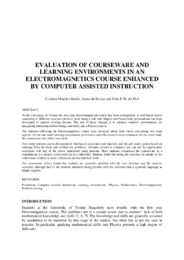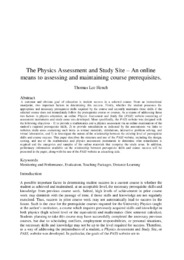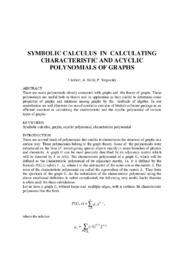Computer Based Learning in Science (CBLIS)
Browse by
Collections in this community
Recent Submissions
-
The development of modeling skills through computer based simulation of an ant colony
(Pedagogical Faculty of University of Ostrava, 2001)Learning in science can be analyzed into a number of constituent components: the acquisition of experiences with natural phenomena provides the basis for the subsequent development of concepts; the mental representation ... -
Using midi in music instruction
(Pedagogical Faculty of University of Ostrava, 2001)The contribution deals with practical use of musical format MIDI in singing lessons and in improving the technique of playing musical instruments. Even the practice of one s part in harmonizing with other musical instruments ... -
An open learning environment for thermal phenomena
(Pedagogical Faculty of University of Ostrava, 2001)In this work we present an open learning environment, suitable for teaching Heat and Thermodynamics. The software consists of two independent visual laboratories (one for Heat and the other for Thermodynamics) and a series ... -
An interactive simulation to evaluate student understanding of moon phase formation
(Pedagogical Faculty of University of Ostrava, 2001)The development of student understanding of phases of the moon is notoriously difficult due to the spatial reasoning requirements posed by the relative motion of three celestial bodies. We have used the Greek version of ... -
How to use e-learning in distance education at Universities
(Pedagogical Faculty of University of Ostrava, 2001)Nowadays we can witness an incredibly fast progress in information and communication technologies, which has brought about a wide variety of possibilities in education. As regards creating and using multimedia prompts in ... -
Project work in informatics lessons
(Pedagogical Faculty of University of Ostrava, 2001)The best known method of integrating knowledge from different subjects is by doing cross-curricula projects. Projects carried out in the classroom involve planning, designing, realisation, presentation and evaluation of ... -
Engineering education using Discovery II
(Pedagogical Faculty of University of Ostrava, 2001)Engineering can be considered to be the application of scientific knowledge. It is a field where ‘hands-on’ knowledge of equipment is very often considered essential. Feedback Instruments designs, develops, and manufactures ... -
Mechanical oscilations and visualisation with mathematical program maple v
(Pedagogical Faculty of University of Ostrava, 2001)This paper engages in using mathematical computer programs in teaching physics at technical universities. As an example there is mentioned making the best of software Maple V for demonstrating forced oscillations and ... -
Using of tips programs packages in engineering education
(Pedagogical Faculty of University of Ostrava, 2001)One of the tasks of higher school is to teach students for creative work. This task equally concerns both to students of natural sciences specialities, and the pupil – “humanities”. In this report the main features of the ... -
Matlab language as tool for symbolic, semi-symbolic and numerical simulation of electrical networks
(Pedagogical Faculty of University of Ostrava, 2001)The paper deals with the application of MATLAB mathematical language [2] for simulation of electrical and electronic networks. A library of about 40 m-files (scripts and functions) is described that solves the following ... -
M.A.P. modular approach to physics Laboratory
(Pedagogical Faculty of University of Ostrava, 2001)We present recent developments in the laboratory component of MAP - Modular Approach to Physics - Java enhanced modules to be used as aids in teaching the first three terms of university physics. The MAP project is very ... -
Transferring innovation through Collaboration: does partnership Work?
(Pedagogical Faculty of University of Ostrava, 2001)If Computer Based Learning in Science is to continue to spread in an effective manner, then it needs to be able to demonstrate that CBLIS enhances and enriches student learning. To do this it firstly needs to be able to ... -
The doctoral thesis: the contribution of computer based learning
(Pedagogical Faculty of University of Ostrava, 2001)The completion of a doctoral thesis is widely accepted as the culmination of a long process of advanced study entailing generic and specific skills. Undertaking a research degree poses new challenges not only in specialist ... -
A web-based approach to the delivery of instruction on information and Communication technology
(Pedagogical Faculty of University of Ostrava, 2001)While web-based courses are not new they are in their infancy. Courses that employ web-based technology to teach about technology are even less common and are attended by a unique set of challenges and intricacies. This ... -
XML in web-based training: Workflow and opportunities
(Pedagogical Faculty of University of Ostrava, 2001)In this paper we point out the benefits of using structured content in Web-Based Training (WBT) scenarios. Using an XML compliant subset of the DocBook document type definition – enriched with semantics for interactive hypermedia ... -
Physics web for everybody
(Pedagogical Faculty of University of Ostrava, 2001)It is the purpose of this contribution to provide basic information about the creation and first period of running of a web for the support of physics education and about some problems we have met during this work. Our web ... -
Evaluation of supporting courseware by means of online and offline questionnaires
(Pedagogical Faculty of University of Ostrava, 2001)A template for worked out problems and tutorials on the internet, as presented in former CBLIS conferences, was recently extended with an evaluation system. At the end of a session the student is prompted to fill in a ... -
Evaluation of courseware and learning environments in an electromagnetics course enhanced by computer assisted instruction
(Pedagogical Faculty of University of Ostrava, 2001)At the University of Twente the first year electromagnetism course has been restructured. A web-based course consisting of different exercises (most of them using a link with Maple) and PowerPoint presentations has ... -
The Physics Assessment and Study Site – An online means to assessing and maintaining course prerequisites
(Pedagogical Faculty of University of Ostrava, 2001)A common and obvious goal of education is student success in a selected course. From an instructional standpoint, two important factors in determining this success. Firstly, whether the student possesses the appropriate ... -
Symbolic calculus in calculating characteristic and acyclic polynomials of graphs
(Pedagogical Faculty of University of Ostrava, 2001)There are many polynomials closely connected with graphs and the theory of graphs. These polynomials are useful both in theory and its application as they enable to determine some properties of graphs and relations among ...

